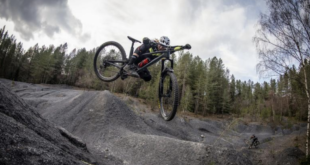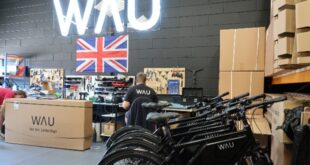This article first appeared in the May issue of BikeBiz, which you can read here.
Let’s not beat around the bush: the 21st Century hasn’t been kind to British bicycle manufacturing. While the companies we talked to in this feature are among the exceptions to the rule – as are the thriving small businesses producing a limited amount of handmade bicycles – the total number of bicycles produced in the UK has fallen from over one million to under 100,000 units in the course of thirteen unlucky years. Great Britain is now just the eighteenth largest producer of bicycles in Europe, nestling somewhere between Lithuania and Finland (according to official COLIPED statistics). Hardly glory days.
But there are a number of brands that are bucking the trend.
Probably uppermost in people’s minds is media-friendly Brompton. Stats handed to BikeBiz reveal that turnover has grown 20 per cent for the West London bicycle maker for the last eight years and that exports are exceedingly healthy – 70 per cent of sales are to overseas markets.
“Brompton has had another strong year,” Quinton Pullinger, marketing manager for Asia Pacific, tells BikeBiz. “In the last 12 months we made 45,000 bikes, a 25 per cent increase on last year. We took on a second site on the Great West Road to house the growing Spares and Accessories departments and the resulting increased sales of luggage and spares have contributed to this sustained period of growth for us.
“This year also saw our showcase event, the Brompton World Championship, move to Goodwood, the hire scheme Brompton Dock now has 33 locations around the UK, and we have brought increasingly advanced technical solutions to both our website, the Bike Builder tool, and our manufacturing facility.
“The celebration of 25 years full time manufacturing last November reminded us that we have made some fantastic progress, but we know that there is still loads to do and we’re hoping 2014 will prove to be another successful year.”
With successes a plenty, Brompton is clear about the advantages that manufacturing on home turf bring, not least being able to keep a close eye on production.
Pullinger explains: “We are closer to the product so we control the quality and define the processes. This, we believe, is crucial to supplying a high quality product. As well as that, keeping the whole manufacture in house means that we can build bikes that have been ordered bespoke within six weeks.
“A high percentage of our UK as well as international dealers have visited the factory as part of the ‘Dealer Day’ programme we have been running. We believe this has had positive outcomes for sales as well as building the brand; there are not many other bike brands that can bring their story alive to their trade customers by showing them the manufacturing process first-hand.”
UK prestige
British craftsmanship and reputation goes a long way abroad too, Pullinger explains: “’Made in Britain’ also means a lot overseas, especially to our Asian customers; there is a sense of nostalgia and heritage that associates Britain with fine quality craftsmanship. This may be a remnant of the past, but British manufacturers are reviving that image and British brands are performing well in global markets.”
That’s something Bradford-on-Avon’s Moulton can corroborate, having been invited to join the Prime Minister on his trade delegation to China, flying the flag for British manufacturing in Beijing, Shanghai and Chengdu alongside around 100 CEOs and reps from key British firms. By request of No.10, Moulton brought a prototype for a Bradford built model, created for the Chinese market. Moulton spokesperson Steven Harvey said of the trip: “With so many cycle brands outsourcing manufacture to the Far East, it feels good to be the exception in this way.”
Moulton’s Jubilee 50, launched in 2012 to mark the anniversary, has been hugely popular, inspiring the firm to increase its offering of Bradford on Avon bicycles with a 20-inch wheel, being offered in three colours (red white and blue, appropriately).
So what are the benefits of manufacturing in Britain? Harvey muses: “We feel good about what we do, about passing the skills down from generation to generation. When we say ‘Made in Britain’, we mean it, rather than the ‘Designed in Britain’ used by others at the moment, which is not the same thing at all.”
That prestige in a British-made product is something that has paid off for Stratford-on-Avon’s Pashley too (something in the water?). The brand told BikeBiz: “In recent years there has been a consumer backlash to the general direction of ‘offshoring’ UK manufacturing. Pashley receives many enquiries from consumers just because they have learned we remain a manufacturer in the truest sense of the word, rather than an importer like many other bike firms. Pashley’s customer appreciates that their product is really made in England, not just because they are reassured about quality and access to high standard of aftermarket customer service, but also because it is the right and responsible thing to do.
“The idea of a real ‘English-made’ product is a huge plus when it comes to export markets. It stands for quality and reliability in the minds of our overseas customers. There are many premium brands that leverage their heritage even though they no longer actually make the product in England. Pashley design, develop and manufacture in Stratford-on-Avon in England and have used this to successfully grow its export business significantly. Pashley Cycles exports now account for over 40 per cent of its output and ships to over 50 countries worldwide with large distribution in North America, Australasia and the Far East. We are also targeting the new emerging markets and expect more success in these areas too. Even the territories closer to home, like Germany and France, are now captivated by the charm of the Pashley product and taking increasing quantities of bicycles.”
Pashley employs over 50 staff in its Stratford factory, but also has a policy of sourcing locally first – indirectly hundreds of other UK jobs in its supplier’s factories depend on the brand’s business. If Pashley seeks to develop something, after first trying in-house, they look to other local Midlands companies and then nationally in the UK. Currently Pashley has almost 100 component suppliers with UK facilities, but does source some components from the Far East only where it isn’t possible to obtain them in the UK or Europe, it tells BikeBiz.
Speed to market
UK manufacture has upsides in terms of speed to market, the Statford-upon-Avon firm adds: “Perhaps one of the biggest [advantages] is the speed to market. While Pashley is often viewed as very traditional, we are forward looking when it comes to design and product development. Pashley has state of the art facilities with CAD product development design systems. Combine these systems with our own manufacturing facility, we can do remarkable things.
“This speed is especially important in the Carrier bike side of the business where customers often need rapid creative solutions, requiring bespoke delivery trikes or bikes delivered urgently. This product development speed also benefits the consumer range of retail product. We can ring the changes very quickly, like for instance the brand new promotion of the Sonnet Springtime products in new fresh colours.”
Perhaps not always as quick to mind as an example of British cycle manufacture, Halifax’s Orange Bikes’ handmade range also sees numerous benefits in producing here in Britain.
Graphics and marketing manager Sim Mainey tells BikeBiz: “The advantages are numerous. Rapid prototyping and development, flexibility in the way we work and the ability to communicate with the people who actually make the frames face-to-face. In-house manufacture, paint and assembly also means we can offer an incredible number of options when it comes to a customer speccing their bike, a key selling point for us. The satisfaction of seeing production through from raw materials to ridable bike is not to be overlooked either.”
The firm has had a solid start to the year with continued success of its ever-popular Five and Alpine 160 models. In January, Orange celebrated 25 years of the Clockwork with a limited edition anniversary model which sold out in just less less than 48 hours.
Mainey adds: “Orange is well known for its downhill racing heritage and we want to carry that on so we’ve partnered with Ben Reid and Dirt magazine to create the Orange Dirt World Team. The team, consisting of Ben, Harry Heath and Jacob Dickson will be flying the Orange flag at selected international and national races and will be helping us to develop future models.”
Sticking with MTBs, Empire Cycles is a low volume, high quality manufacturer, by its own admission. Recent release MX6-EVO is a bike for challenging terrain, with a strong DH pedigree in its DNA that comes from Empire’s cult classic AP-1 downhill bike. For founder Chris Williams, making the frames locally is advantageous for a number of reasons: “Control, communication, quality, just in time stock, working with great people, supporting other great companies… We have found lots of smaller companies that do a great job and really want to work with us.”
Cost and image problems
Manufacturers clearly have a sack full of reasons why making product on British soil works for them, but it’s not all roses, otherwise everyone would be doing it. Pashley nails it for us: “It is much more expensive. That’s why so much production of so many goods has been pushed offshore. Many costs are much higher in the UK including direct labour, raw materials, utilities and property. Pashley products are premium priced for that reason but our customers certainly appreciate the value that is built into each product. Keeping all our manufacturing close at hand means we have tight control of all environmental and social responsibilities along with the health and safety involved in the manufacture of its bikes – which are is much tighter in the UK than in the Far-East.”
It’s worth it, Pashley is quick to add: “We see the bike importers continuing to take risks by buying from uncontrolled factories with dubious or variable quality standards and questionable treatment of their employees. Pashley has a policy of providing a safe environment, continuously developing its employees and treating them fairly. We consider their sustainable outlook and UK manufacturing base among our very greatest assets.”
Moulton also points to the added costs of making product this side of the Channel: “The disadvantages of course come with having to compete against those with far lower overheads. But it can be done.”
To underline the point, Chris Williams explains how Empire Cycles battles to keep costs manageable: “Labour costs are higher so we need to work hard to keep the price correct for everyone. We feel that the MX6-EVO is a great example of this – £999 for the frame set including RT3 and £2,499 for the built bike fitted with Hope wheels, breaks, headset, revelation forks and Conti tyres – that’s a great bike for the price.”
Aside from those larger overheads, there’s an additional problem with UK manufacturing, including an image problem that is curbing an influx of talent, Brompton’s Pullinger reckons: “Manufacturing and engineering has, over a number of decades, become deeply uncool as a career for young people in the UK to aspire to. There are a number of initiatives going on to counteract this but more needs to be done to fill the growing number of jobs in the industry over the next few years. We would love to see more talented people entering the exciting world of UK manufacturing.
“Cost can also be an issue; basing yourself in West London may not seem the shrewdest of moves but it makes sense for us. Our workforce has a highly specialist skillset which has developed over 25 years of manufacturing in the capital. We’re closest to some of our major accounts, and it also forces us to be as lean and efficient as possible.”
If you’re not a huge player, size can be an issue too, says Mainey of Orange: “Sometimes we suffer from our flexibility, as our frames are made in small batches ‘just down the road’ we are often asked by customers for one-off frames or tweaks to an existing frame.
“While we can offer our customers a whole host of options we do have limits. There’s no denying the Far East has an incredible pool of resources and knowledge, some of which can be harder, but not impossible, to find in the UK. However, we see this as even more reason to support UK manufacture and to grow the skills base in this country.”
 BikeBiz Bicycle and cycling retail news
BikeBiz Bicycle and cycling retail news



